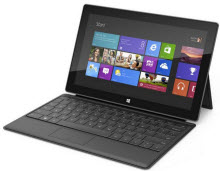Are OEMs to blame for poor Windows 8 holiday sales?


While Microsoft is publicly claiming to be happy with Windows 8 sales, a report has surfaced claiming that, behind the scenes, the Redmond, Washington-based software giant is blaming manufacturers for not building enough Windows 8-powered tablets.
The report comes via The Register, and is based on insider claims that the Redmond giant is now blaming OEMs for ignoring its advice to build PCs that would show off and make use of the operating system's new features.
"Microsoft is very frustrated with major OEMs," claimed the insider. "[OEMs] didn't build nearly enough touch systems, and are now struggling to find parts and ramp up. Microsoft says they provided very specific guidance on what to build."
But another source hit back at Microsoft, claiming that the OEMs "couldn't afford to make lots of product, lots of high-priced touch," because while "people would look at nice high-end products," they would ultimately end up buying a budget device.
Microsoft had also held a competition between OEMs to come up with the best PC. The best systems were to be pushed under two different labels--high specification "Hero PCs," and "Featured PCs" that had more mainstream appeal. Microsoft wanted 10 major "Hero PCs" to be advertised globally, and had promised to pay retailers to promote as many as 20 PCs on the "Featured PCs" list.
However, the source said that the competition was "opaque," and went on to claim that Microsoft was distracted by its own Surface tablet efforts, and as a result, failed to put enough effort into both educating users as to the new features and pushing traditional PC systems.
While there's certainly a symbiotic relationship between Microsoft and its hardware OEMs, with fortunes tied to each other's success, it's clear that the PC industry is in a pretty severe tailspin.
OEMs--most of which are operating on razor-thin margins--no longer have the wriggle room to take big risks, since a blunder could push a company past the point where it could be able to recover. Consumers are incredibly price sensitive, and this means that they prefer mainstream gadgets, including desktops and notebooks, to pricey ultrabooks and tablets. Even Microsoft's own Surface Pro tablet commands a premium price tag that's too high for the average consumer to swallow.
OEMs know that they can shift far more PCs priced in the $350 to $500 price bracket than they can tablets in $1,000-plus price range. This is why they are wary of making any bold moves when it comes to tablets. Enough companies--BlackBerry, Motorola, HP, and so on--have fumbled enough to make everyone else cautious. Not a single OEM wants to make hundreds of thousands of high-end tablets, only to have them sit on shelves ignored and gathering dust.
OEMs are playing it careful when it comes to Windows 8, and with good reason. While Microsoft may have thought that it was a good idea to pursue the touch/tablet markets, we have yet to see proof that this was the right move.
Until then, don't expect any hardware partner to take momentous risks.